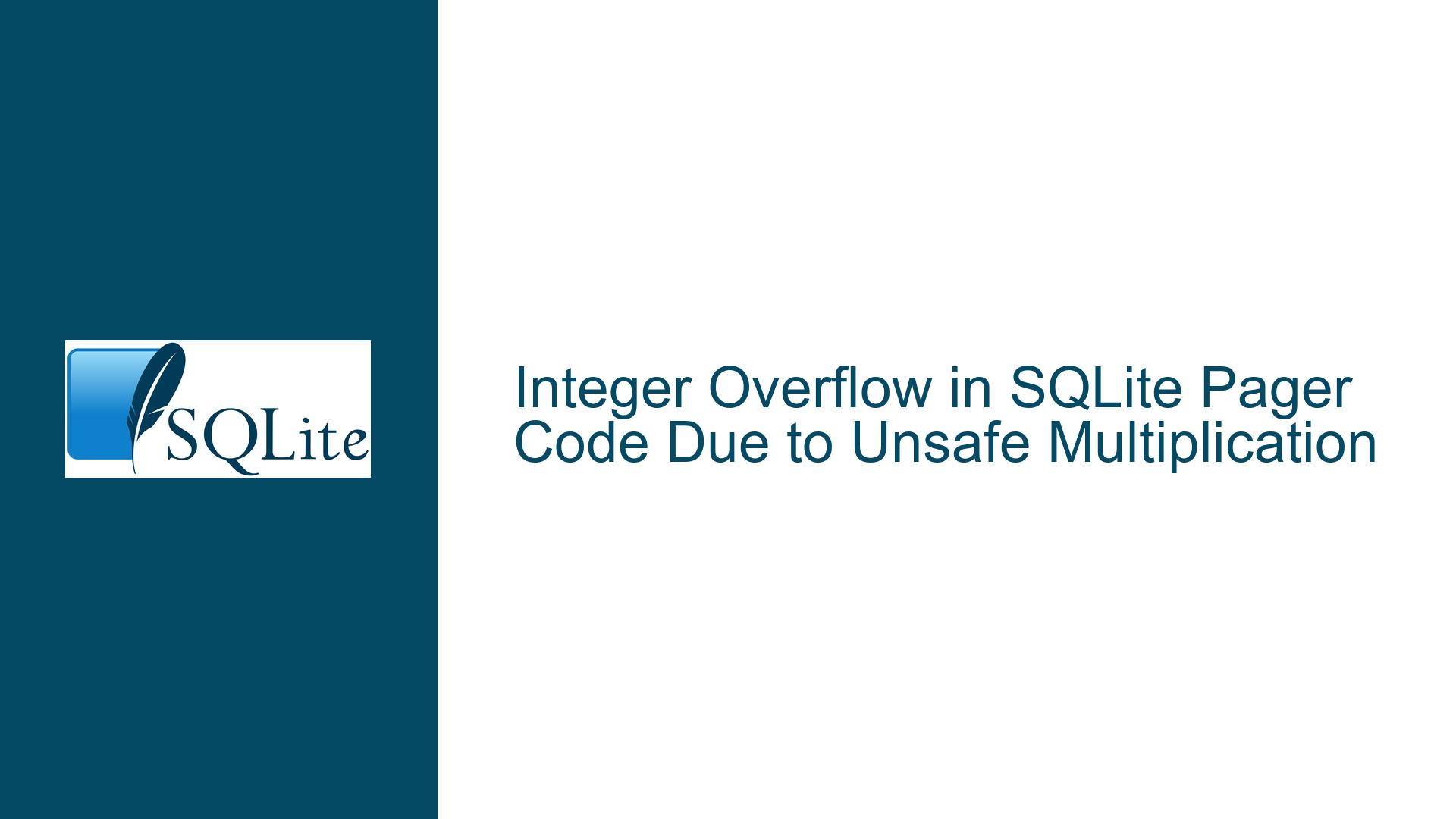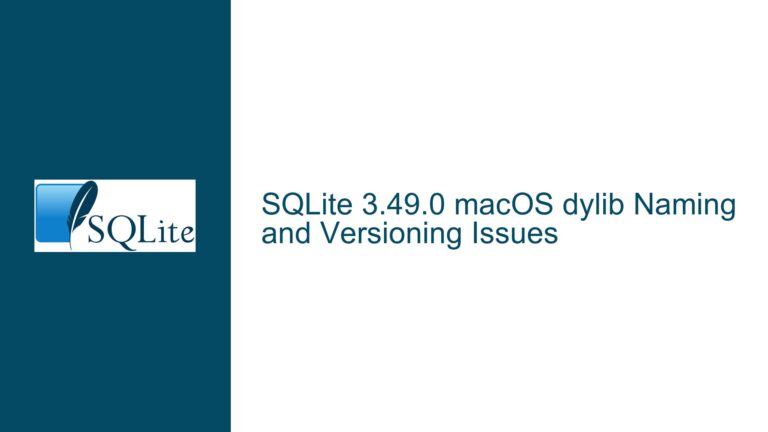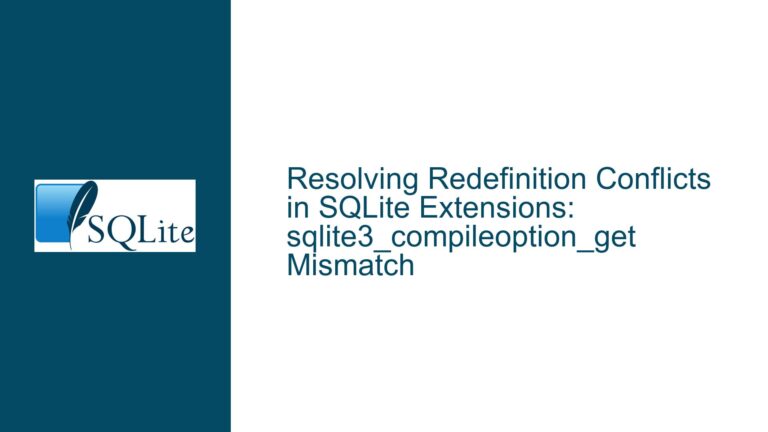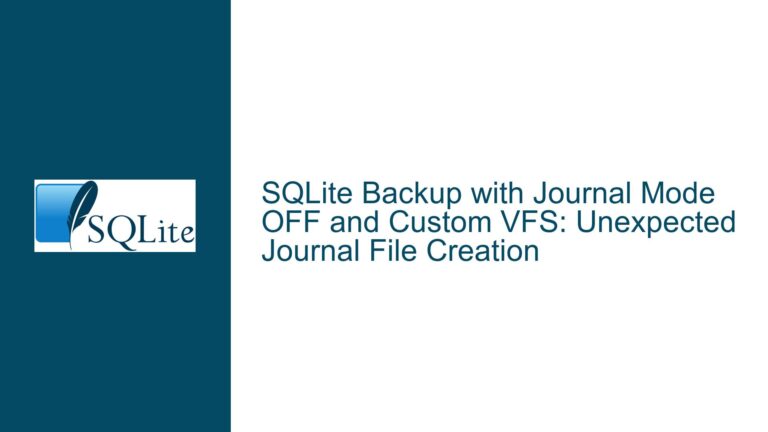Integer Overflow in SQLite Pager Code Due to Unsafe Multiplication
Issue Overview: Integer Overflow in Pager Code Due to Unsafe Multiplication
The core issue revolves around an integer overflow vulnerability in the SQLite pager code, specifically within the pager.c file. The problem arises from an unsafe multiplication operation involving two 32-bit integers, pPager->pageSize and pRel->iSubRec, which are then assigned to a 64-bit integer. The multiplication is performed in 32-bit arithmetic before the result is promoted to 64 bits, which can lead to overflow if the operands are large enough. This issue is particularly concerning because SQLite’s maximum page size is 65536 bytes, and the number of subrecords (pRel->iSubRec) can also be large, potentially exceeding the 32-bit limit when multiplied together.
The multiplication in question occurs in the following line of code:
i64 sz = (pPager->pageSize + 4) * pRel->iSubRec;
Here, pPager->pageSize is of type int, and pRel->iSubRec is of type Pgno (an alias for u32, or unsigned 32-bit integer). The result of the multiplication is assigned to sz, which is of type i64 (a signed 64-bit integer). However, due to the rules of the C language, the multiplication is performed in 32-bit arithmetic before the result is promoted to 64 bits. This means that if the product of (pPager->pageSize + 4) and pRel->iSubRec exceeds the maximum value that can be represented by a 32-bit integer, an overflow will occur, leading to incorrect results.
The issue is further compounded by the fact that the maximum page size in SQLite is 65536 bytes, and the number of subrecords can also be large. For example, if pPager->pageSize is 65536 and pRel->iSubRec is also 65536, the product of these two values would be 4294967296, which exceeds the maximum value that can be represented by a 32-bit unsigned integer (4294967295). This would result in an overflow, and the value assigned to sz would be incorrect.
Possible Causes: C Language Rules and Operand Size Mismatch
The root cause of this issue lies in the rules of the C language regarding arithmetic operations and type promotion. In C, when two integers of the same type are multiplied, the result is also of that type. If the result exceeds the range that can be represented by that type, an overflow occurs. In this case, both pPager->pageSize and pRel->iSubRec are 32-bit integers, so the multiplication is performed in 32-bit arithmetic, even though the result is assigned to a 64-bit integer.
The C language does not automatically promote the operands to a larger type before performing the multiplication. Instead, the multiplication is performed in the type of the operands, and the result is then promoted to the type of the variable to which it is assigned. This means that if the operands are 32-bit integers, the multiplication will be performed in 32-bit arithmetic, and the result will be promoted to 64 bits only after the multiplication is complete. If the result of the multiplication exceeds the range of a 32-bit integer, an overflow will occur, and the promoted value will be incorrect.
Another factor contributing to this issue is the mismatch between the types of the operands. The pPager->pageSize is of type int, which is a signed 32-bit integer, while pRel->iSubRec is of type Pgno, which is an unsigned 32-bit integer. When these two values are multiplied, the result is of type int, which is a signed 32-bit integer. This means that if the result of the multiplication exceeds the range of a signed 32-bit integer, an overflow will occur, and the result will be incorrect.
The issue is further exacerbated by the fact that the maximum page size in SQLite is 65536 bytes, and the number of subrecords can also be large. For example, if pPager->pageSize is 65536 and pRel->iSubRec is also 65536, the product of these two values would be 4294967296, which exceeds the maximum value that can be represented by a 32-bit unsigned integer (4294967295). This would result in an overflow, and the value assigned to sz would be incorrect.
Troubleshooting Steps, Solutions & Fixes: Ensuring Safe Multiplication with Proper Type Promotion
To address this issue, it is necessary to ensure that the multiplication is performed in 64-bit arithmetic, rather than 32-bit arithmetic. This can be achieved by explicitly casting one or both of the operands to a 64-bit integer before performing the multiplication. This will ensure that the multiplication is performed in 64-bit arithmetic, and the result will be correctly assigned to the 64-bit variable sz.
One possible solution is to cast one of the operands to i64 before performing the multiplication. For example:
i64 sz = (i64)(pPager->pageSize + 4) * pRel->iSubRec;
In this case, (pPager->pageSize + 4) is explicitly cast to i64, which ensures that the multiplication is performed in 64-bit arithmetic. This will prevent any overflow from occurring, even if the operands are large.
Another possible solution is to cast both operands to i64 before performing the multiplication. For example:
i64 sz = (i64)(pPager->pageSize + 4) * (i64)pRel->iSubRec;
In this case, both (pPager->pageSize + 4) and pRel->iSubRec are explicitly cast to i64, which ensures that the multiplication is performed in 64-bit arithmetic. This will also prevent any overflow from occurring, even if the operands are large.
It is also important to ensure that the maximum values of the operands are within the range that can be safely multiplied without causing an overflow. In this case, the maximum page size in SQLite is 65536 bytes, and the number of subrecords can also be large. However, as long as the multiplication is performed in 64-bit arithmetic, the result will be correct, even if the operands are large.
In addition to the above solutions, it is also important to consider the potential impact of this issue on other parts of the code. For example, if the result of the multiplication is used in other calculations or comparisons, it is important to ensure that those calculations or comparisons are also performed in 64-bit arithmetic. This will ensure that the results are correct, even if the operands are large.
Finally, it is important to thoroughly test any changes to the code to ensure that they do not introduce any new issues or regressions. This includes testing with large values of pPager->pageSize and pRel->iSubRec to ensure that the multiplication is performed correctly and that no overflow occurs. It is also important to test with a variety of different values to ensure that the code behaves correctly in all cases.
In conclusion, the issue of integer overflow in the SQLite pager code can be addressed by ensuring that the multiplication is performed in 64-bit arithmetic, rather than 32-bit arithmetic. This can be achieved by explicitly casting one or both of the operands to i64 before performing the multiplication. It is also important to ensure that the maximum values of the operands are within the range that can be safely multiplied without causing an overflow, and to thoroughly test any changes to the code to ensure that they do not introduce any new issues or regressions. By following these steps, the issue can be resolved, and the code can be made more robust and reliable.






